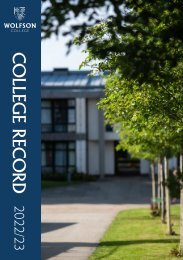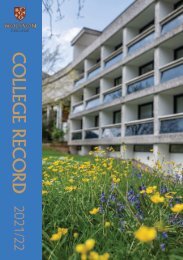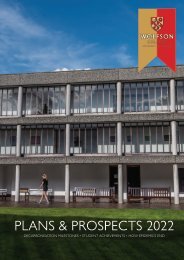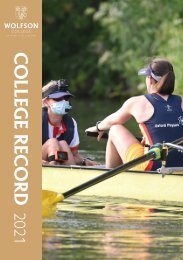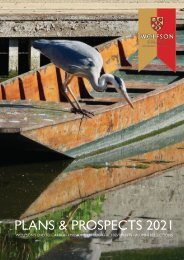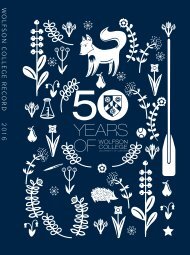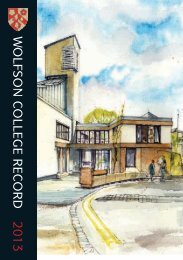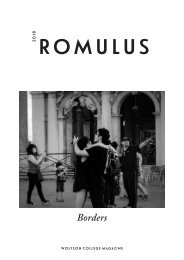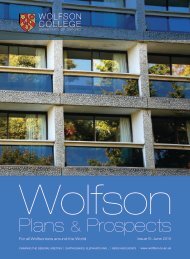Create successful ePaper yourself
Turn your PDF publications into a flip-book with our unique Google optimized e-Paper software.
THE RECORD<br />
In Search of Isaiah<br />
Berlin: A Literary<br />
Adventure<br />
Henry Hardy (HF)<br />
Isaiah Berlin was one of the greatest thinkers<br />
of the twentieth century – a man who set<br />
ideas on fire. His defence of liberty and<br />
plurality was passionate and persuasive and<br />
inspired a generation. His ideas – especially<br />
his reasoned rejection of excessive certainty<br />
and political despotism – have become even<br />
more prescient and vital today. But who<br />
was the man behind such influential views?<br />
In Search of Isaiah Berlin tells the compelling<br />
story of a decades-long collaboration<br />
between Berlin and his editor, Henry<br />
Hardy, who made it his vocation to bring<br />
Berlin’s huge body of work into print. Hardy<br />
discovered that Berlin had written far more<br />
than people thought, much of it unpublished.<br />
As he describes his struggles with Berlin,<br />
who was almost on principle unwilling to<br />
have his work published, an intimate and<br />
revealing picture of the self-deprecating<br />
philosopher emerges. This is a unique<br />
portrait of a man who gave us a new way<br />
of thinking about the human predicament,<br />
and whose work had for most of his life<br />
remained largely out of view.<br />
A fuller appreciation of this book follows,<br />
for which we thank Christopher Schenk (GS<br />
1972–75)<br />
This delightful book contains intriguing<br />
insights into the character and personality<br />
not only of Isaiah Berlin but also of its author,<br />
Henry Hardy. Hardy begins by positing<br />
himself and Berlin as polar opposites: the<br />
genius, adept at delineating the bigger<br />
picture but careless with details, and the<br />
pedant, meticulous and punctilious about<br />
accuracy, to the point of obsession.<br />
As the story progresses, it becomes obvious<br />
that they have quite a lot in common. For a<br />
start, they are both good writers, masters of<br />
that dying literary art form, the long letter.<br />
More importantly, they are both remarkably<br />
candid about their thoughts and feelings. They<br />
do not dissemble: there is no guile in them.<br />
Nevertheless, their honesty is by no means a<br />
guarantee that their accounts of themselves are<br />
accurate.<br />
Hardy writes to Berlin in 1976, ‘You have a<br />
refreshing candidness and directness about<br />
dissenting from received opinion’. Hardy’s own<br />
honesty is described as ‘directness’, though ‘to<br />
be direct’ in this sense seems to be one of those<br />
irregular verbs: I am direct, you are tactless, he is<br />
rude.<br />
As a graduate student in the early days of<br />
Wolfson, Hardy was remarkably busy and<br />
productive. As well as completing two degrees,<br />
he founded and edited Lycidas, Wolfson’s first<br />
magazine; he set up his own publishing imprint<br />
using his middle names of Robert Dugdale; he<br />
played the organ at St Frideswide’s, directed<br />
a choir, ran the <strong>College</strong> music society, and<br />
composed a number of short pieces; he even<br />
found time to teach Ancient Greek to Cecilia<br />
Dick’s younger daughter, Cressida, who is now<br />
the Commissioner of the Metropolitan Police. It<br />
was at this time that, with the encouragement<br />
of Sam Guttenplan, he embarked on what was<br />
to become forty years of work, to give the lie to<br />
Maurice Bowra’s famous quip that ‘like Our Lord<br />
and Socrates, Isaiah does not publish much.’<br />
In those heady days before the <strong>College</strong> moved<br />
to Linton Road, Wolfson was a remarkably<br />
egalitarian institution. Stephen Grounds tells the<br />
story of how he introduced himself to the older<br />
man standing next to him in the queue for lunch<br />
at 60 Banbury Road, with the words ‘I’m Stephen<br />
Grounds and I come from Birmingham’, to be<br />
greeted with the rejoinder ‘I’m Isaiah Berlin and<br />
I come from Riga.’ Berlin involved himself with<br />
the graduate students in a number of ways, for<br />
92<br />
COLLEGE RECORD <strong>2019</strong>



